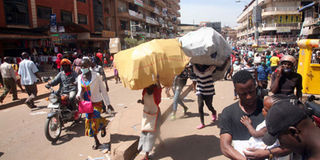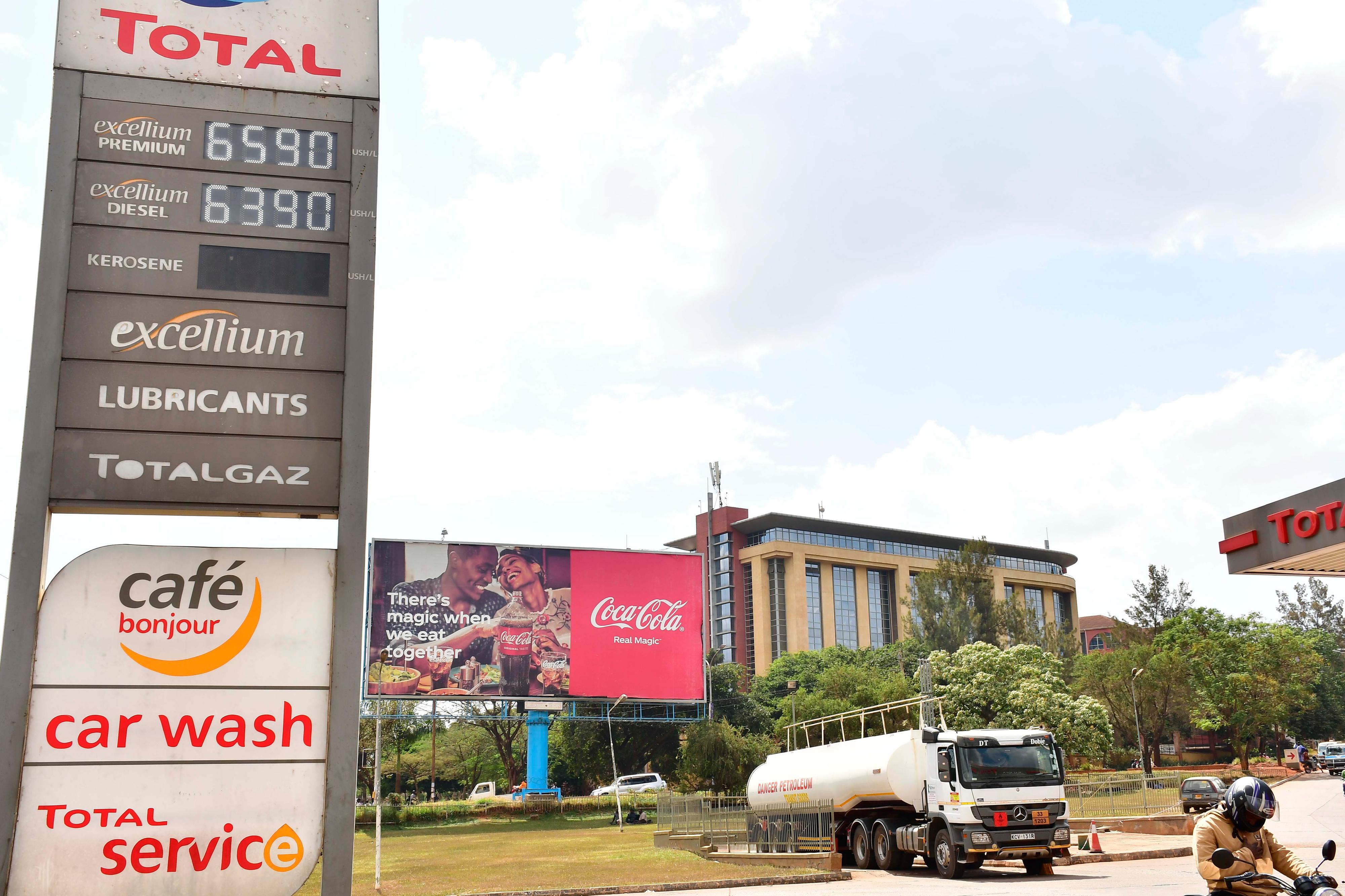Prime
Will current economic shocks really end soon?

Traders carry sacks of merchandise in Kampala. Government should make sure household incomes increase to spur demand for goods and services.
What you need to know:
High inflation will continue eroding stagnant incomes and spending, with poor and vulnerable households being affected most. Uganda Bureau of Statistics figures show that the annual inflation rate for food crops has drastically increased from 0.7 percent in February 2022 to 14.5 percent in June 2022.
Higher energy, fuel, food prices and climate change are featuring prominently in some of the severe economic shocks countries are likely to continue facing in the short term, adding to inflationary pressures squeezing incomes of households around the world.
Inflation is on the rise in the advanced economies, emerging markets economies and in the least developing countries like Uganda, a negative development, which puts millions of people’s lives in danger because their incomes are getting eroded every single day due to high cost of living which seems to persist, although the government officials/policy makers tend to believe it is a temporary shock!
The rising food, fuel and energy prices have been driven in large part by pent-up consumer demand after the pandemic and Russia Ukraine war thus exacerbating economic shocks, governments from around the world are currently struggling with as they try to provide solutions to current economic shocks.
During his presentation on: The Rising Cost of Living: Survival Response at the 10th Economic Forum by the Institute of Certified Public Accountants of Uganda, on July 21, the lecturer at Makerere University’s School of Economics, Dr Fred A. K. Muhumuza said food, fuel, utilities & transport remain a major threat as they account for almost 50 percent of household costs and are essential.
Over the last one year, there have been movements in specific commodity prices: maize 57.2 percent, beans 13.9 percent, cassava flour31.6 percent, sweet potatoes 35.1 percent, rice15.8 percent, tomatoes 51.1 percent, sugar 20.1 percent, petrol 46.1 percent, diesel 64.8 percent, Kerosene 35.6 percent.
Dr Muhumuza said the risk of food crisis remains acute for the entire world due to supply shortages, disruptions and elevated costs.
He said inadequate use of fertiliser and extreme temperatures in Europe that have affected wheat harvests will prolong global hunger into next year.
“Possible remedies are blocked: No international cooperation to avoid a food crisis; and export restrictions are in place in some places and are limiting efforts to transport commodities; while targeted aid is scanty,” he said.
In a comprehensive manner, he raised concerns that many low-income and emerging market economies will be challenged even more by rising food and energy prices, slower demand growth in their export markets, and the potential for capital outflows as interest rates rise in the advanced countries.
During his presentation which received a prolonged attention of participants in the economic forum, a number of questions came up. One of the overriding questions was about the root cause of the rising cost of living. Participants were concerned about government’s stance on not intervening in the rising cost of living.
Responding to these Dr Muhumuza said: “Uganda’s economy is now on a downward spiral. But the country’s decision making lapses are exposing the economy to external factors. There are decisions that must be taken now to create solutions to the rising cost of living in the medium to long-term.”

Dr Fred A. K. Muhumuza, a lecturer at Makerere University’s School of Economics.
Dr Muhumuza said high prices should signal for people to adjust their lifestyles and focus on priorities. External influences such as the Ukraine-Russia war are only finding a weak situation.
“The root cause is the fragility within the structure of the economy. We have reached a level where Structural Adjustment programmes must intervene. Budget cuts alone won’t help. If money for a service is not available, think about the existence of the service,” he said.
Uganda has undergone several economic reforms such as liberalisation/privatisation, which has led to remarkable economic progress but challenges continue to exist in the country.
On restructuring the government, he said cutting non-wage expenditure is not the solution. He argued that capital intensive projects should be postponed and have those resources channeled to boosting household income.
The government has the programme of rehabilitating the meter gauge railway as well as constructing the Standard Gauge railway line.
However, Dr Muhumuza said the construction of the Standard Gauge should be paused. “Construction of roads, building industrial parks, investments in the standard gauge railway can resume in 2028,” he said.
He further explained that the economy is also currently starved of working capital. This is largely as a result of the government’s debt constraints. But a bigger budget with lower revenue will only lead to higher borrowing, pushing the economy deeper into debt.
“About 35 percent of the Budget is going to debt! It would be good to raise the salaries of teachers but this is not possible now,” Dr Muhumuza said.
Solutions
Asked about government’s intervention to the current economic shocks in the medium to long-term, Dr Muhumuza said the government should make sure household incomes increase to spur demand for goods and services.
Adding: “Giving some Shs100,000 to households every six months would create a difference.”
He cited countries where the unemployed people are paid employment benefits to maintain their purchasing power. To make things better, he also proposed the need to revisit agricultural strategies.
During his keynote address on the theme: “A responsive Economic Development Agenda” on day one at the 10th Institute of Certified Public Accountants of Uganda Economic forum, the executive director of National Planning Authority, Dr Joseph Muvawala warned that the country is currently faced with a serious economic crisis in form of food insecurity. As a result, many people are being affected by hunger since there is no food in other parts of the country.
“We have serious food insecurity in this country,” he said.
Dr Muvawala offering some solutions to the current situation outlined various things that the government can do to manage short-term food shortages to ensure food security in the country.
He said the government should provide food relief to highly deprived areas like Karamoja by purchasing from surplus areas in the country.
To better identify the vulnerable, he said the government should use the Parish Development Model (PDM) to capture accurate data using the Parish-based Management Information Systems which is pillar six.
The others, which he mentioned include the need to stock adequate food reserves pointing out that Uganda has 736,650 metric tonnes silo capacity which is largely private-sector-owned and underutilised.
“Government should buy food and hire silos (for an adequate space to cushion the country for about 2 months) from the private sector to stock them with food supplies to act as buffers during periods of scarcity. Leveraging the Parish Development Model resources for food production (Pillar 1),” he said.
In this regard, he suggested that the government should support large scale farmers so as to increase food production and the key areas should include mechanization and water for production.
“Government should prioritise water for production and fertiliser usage to increase production and productivity of agriculture enterprises,” he said.
He observed that while there have been some irrigation schemes in the country all have focused on rice. “90 percent of the irrigation is in rice yet Ugandan rice is not competitive. We are using Tanzanian rice. Irrigation system in Uganda should be focused on maize and beans,” he said.
In related development, Dr Muvawala said there is need to undertake and accelerate production and productivity strategies and interventions as highlighted in the respective NDPIII Programme Implementation Action Plans (PIAPs), especially in the Agro-industrialisation Programme, along the entire value-chain, institute early warning systems against disasters, famines and any other risks, include and engage stakeholders in the development process at all levels.
Specific to environmental responsiveness, Dr Muvawala said for sustainable development, the development process should be cognisant of the environment. This should also be highlighted and incorporated in the economic development agenda.
Dr Muvawala said an economic development agenda should respond to the preservation of the environment for a number of reasons. Among other reasons: sufficient precipitation occasioned by maintaining and or increasing forest and wetland cover is vital for hydropower generation, agriculture, fisheries, domestic water supply, industry, navigation, tourism, wildlife and ecosystems. Proper wetland management is necessary to mitigate flood risks, maintenance of aquatic ecosystems, and access to fresh water. Environment preservation is also critical for human health and tourism.
“These are exhaustively articulated in the NDPIII Natural resources, Environment, Climate change, Land and Water Programme. Climate Change Management: Adaptation and mitigation of climate change orchestrated impact of droughts, floods, heat waves and landslides on the livelihood of vulnerable populations is critical for reducing income inequality. The economic development agenda should be responsive to climate change,” he said.
Currently, the country is gripped with the problem of prolonged sunshine which signals great impact of climate change in the country. Dr Muvawala said adding that a responsive economic development agenda should help to address drought and famine across the country.
There has been increased salaries for medical workers and the science teachers in the country. However, Dr Muvawala said the government should consider improving public sector pay when the economy improves.
Towards this end, in light of the current fiscal challenges, all recent policy commitments on wage increments should be staggered over the medium term.
An independent Salary Commission should be set up to rationalise pay of public servants including politicians. Increasing wages alone may not improve the performance of public servants.
He said a good monitoring mechanism that ensures better performance will be required in addition to improving the entire eco-system for better service delivery.
Cut costs
On the current public expenditure, he said there is need to reduce Government administrative costs by capping creation of new administrative units, and curtailing the growth of the legislature, and implementing the rationalisation of Agencies including Ministries, and Local Governments. This will facilitate the switching of resources into productive areas such as manufacturing, agroindustry, light and heavy industry.
He further stated that there should be a move to switch spending on government imports such as vehicles and military hardware, in the short run to create fiscal space for priorities and release pressure from the exchange rate.
The priorities include food security, fast-tracking petroleum investments, iron and steel, digitising service delivery to attain efficiency, and investment in some development opportunities and also solving the inflationary pressures highlighted earlier.
“There is need for better coordination of the monetary and fiscal policies. With the fiscal expansion witnessed in the last three years, the implementation of monetary policy is likely becoming ineffective. Supplementary budgets and domestic borrowing are a serious concern and depict a lack of coordination between fiscal and monetary policy management,” he said.
Parish Development Model
Regarding the Parish Development Model being celebrated before taking off, Professor Twaha Kaawaase senior lecturer, Makerere University Business said the budget allocation of Shs1.1 trillion for Parish Development Model and equal distribution of Shs100 million for every parish is wrong.
“The allocation of the Parish Development Model is based on the number of parishes in the country, not the population. Some parishes have few people and other parishes have many people and they are getting the same amount of money! The distribution should have been based on the population, not number of parishes,” he said.




